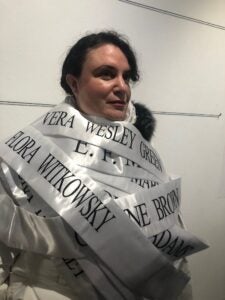Professor Writes Play About Wells-Barnett, Addams as Critique of White Feminism
Bitter Flower, a play by Jennifer Natalya Fink, professor in the Department of English at Georgetown and Director of the Program in Disability Studies, will debut as an online film at the end of August as part of the Burning Coal Theatre’s 19th Amendment Festival, which features some of America’s most prominent female and non-binary playwrights. In the wake of the centennial of the ratification of the 19th Amendment, Bitter Flower examines the racism of the white suffrage movement and the undervalued work of Black suffragists.
Shedding Critical Light on White Feminism
The idea for this play emerged from Underbelly, a performance piece created by Fink and artist Julie Laffin, that was showcased at the 2020 College Art and Art History Association meeting in Chicago. As part of the performance, 50 women paraded down Michigan Avenue donning sashes with the names of white and Black suffragists on one side, and their achievements or racist acts on the other side.

Jennifer Natalya Fink at Underbelly
In researching this performance piece, Fink became fascinated with the relationship between Jane Addams, founder of Hull House, and Ida B. Wells-Barnett, a prominent civil rights leader and founder of the Black women’s club movement who was instrumental in bringing lynching and other atrocities into the public eye. Fink wanted to examine how the conflicts between these women in their fights for equality underscored foundational issues within feminism.
“Though they were both influential suffragists in Chicago in the late 19th and early 20th centuries, their interactions were representative of how white suffragists exploited Black feminists without renouncing racism and lynching,” says Fink. “I decided to reimagine an encounter between these two women based on an exchange of essays written by them, and so Bitter Flower was born.”
Bitter Flower, Strange Fruit
Addams, who was raised in an upper-class family, first became a prominent figure in Chicago and was once referred to by Wells-Barnett as “the most powerful woman in the world.” She started the field of social work and was the first woman to receive the Nobel Peace Prize. Simultaneously, Wells-Barnett, who single-handedly raised her six siblings after the death of her parents when she was 16, was a noted journalist and educator who was a revolutionary leader in the civil rights movement and the fight for gender equality.
Though both individuals collaborated to maintain the desegregation of schools in Chicago as well as co-founded the NAACP, the two women had an uneasy alliance fueled by the segregationist and racist practices of the white suffragist movement.
In her original essay “Respect for Law” published in The Independent, Addams argued that Black male violence against white women was rampant and caused by alcoholism. She acknowledged that the lynching of Black men was not the most effective way to mitigate the rape of white women, and suggested that giving women the right to vote would result in the abolishment of alcohol since a greater number of women were pro-temperance than men. This would ultimately lead to fewer rapes of white women and therefore lynchings of Black men. Shocking though this logic seems to us now, this racist reasoning for suffrage was central to the early white feminist movement.
Wells-Barnett, in her counter-article “Lynching and the Excuse for It,” disproved Addams claims that Black men were primarily lynched because of acts of sexual violence against white women. Her article outlined a study she single-handedly conducted that analyzed police reports related to lynching. She found that Black men were overwhelmingly lynched because they owned property or a business and not as a result of sexual violence against white women.

Poster of Bitter Flower
Fink reimagines this exchange in Bitter Flower as a series of meetings between Wells-Barnett and Addams that intersperse both articles. In one scene, Addams coerces Wells-Barnett to taste tea made from the arugula flower that her female partner brought back from Italy as a nod to both the classist and racist undertones that “are the core of the drama in Bitter Flower.”
“The appalling racism undergirding the U.S. women’s suffrage movement–and the courageous work by Black women like Wells-Barnett to contest it–is exemplified by this exchange,” says Fink. “Though Black and white women both worked for suffrage, it was not an integrationist movement by any stretch of the imagination. Moreover, the violent racism—and the racist imagination that Addams exemplifies—structuring the very heart of the white American suffrage movement continues to shape the feminist movement to this day.”
Creating Intersectional Feminism
Fink says that she wanted to create this play now so that the current feminist movement can learn of the racist roots of the suffragist movement and continue to change for the better.
“As we honor and remember the centennial of the ratification of the 19th Amendment, we must come to terms with both the deplorably racist and under-recognized Black radical roots of the movement,” she explains. “By understanding our history through these two figures, we will be able to create a movement that is more radically inclusive and does not center cisgender, white, straight, women.”
An interview with Fink about the play will be featured on the RDU Onstage podcast starting August 23. Bitter Flower debuts online August 28, and will run online for a month.
